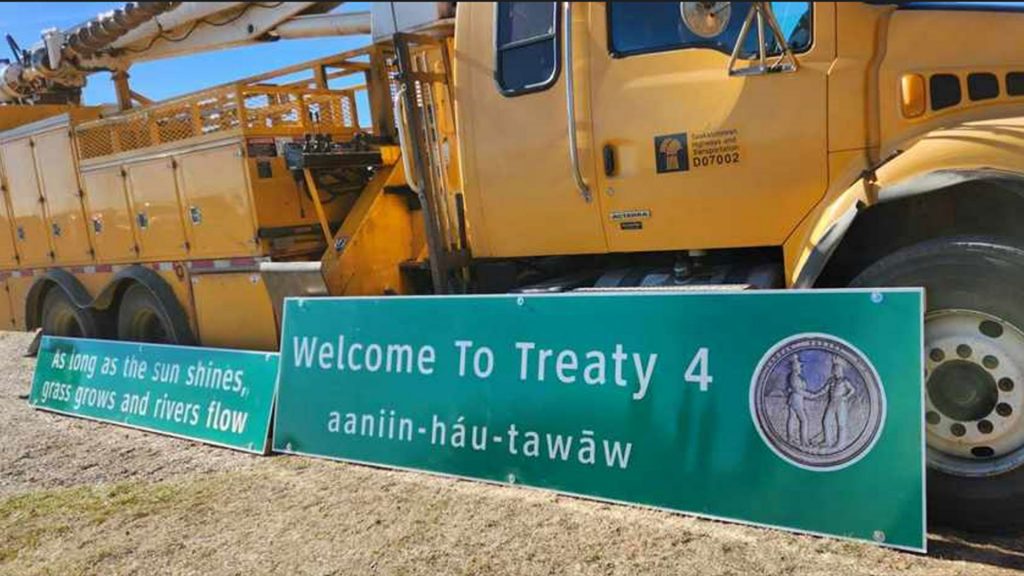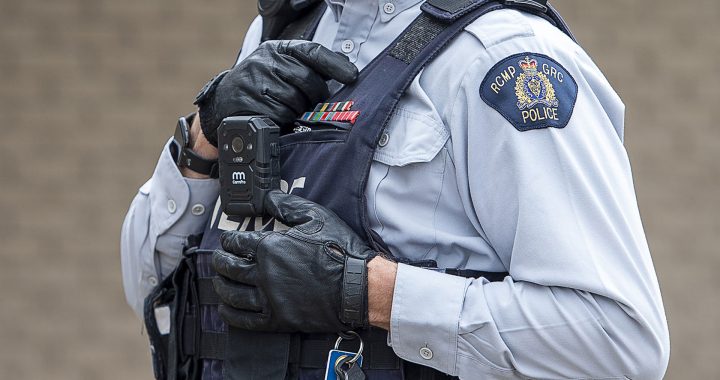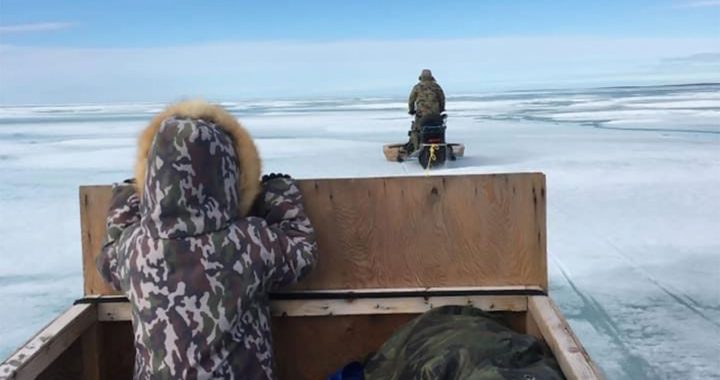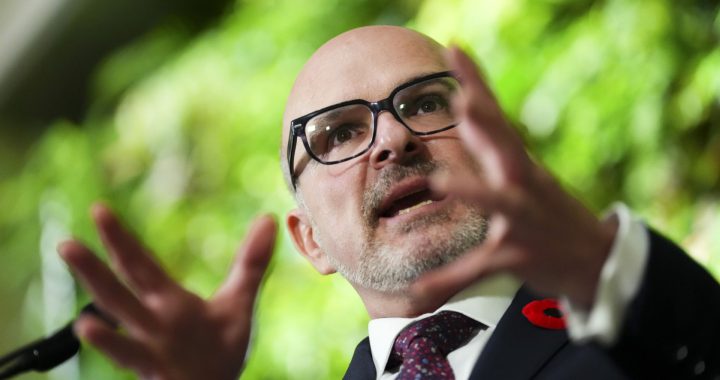
Territory signs are ready to go up along Hwy 11 in Saskatchewan. Photo courtesy: Office of the Treaty Commission.
The Federation of Sovereign Indigenous Nations (FSIN) is taking Saskatchewan’s premier to task for his plan to “protect” the province’s constitutional rights against Ottawa.
On Oct. 11, Premier Scott Moe unveiled what he’s calling The White Paper – Drawing the Line: Defending Saskatchewan’s Economic Autonomy, a plan to protect Saskatchewan’s jurisdiction over natural resources.
Moe was addressing the Battleford’s Chamber of Commerce and did not mention Treaties or First Nations. During his presentation of the plan, Moe said he was taking steps to clarify and protect Saskatchewan’s rights against Ottawa’s environmental policies including levelling a carbon tax on users in the province.
Those steps could include introducing new provincial legislation.
The policy paper claims the federal government’s environmental policies would cost the province $111 billion over 12 years.
In light of the financial impacts on Saskatchewan, Moe vowed to affirm and advance the province’s constitutional authority and autonomy within Canada. In a statement emailed to APTN, Moe said his government wants all Saskatchewan people to participate in the economy and benefit from it.
“Saskatchewan has a great history of working together with First Nations partners on economic opportunities, whether it be through the Indigenous Investment Financing Corporation or through initiatives like forestry agreements,” said Moe’s office in a statement.
“Our government’s actions to protect and defend our exclusive constitutional jurisdiction over natural resources does not in any way diminish or detract from First Nations treaty rights, as they are enshrined in the Constitution. Our goal is to unlock Saskatchewan’s economic potential for the benefit of everyone in our province, including First Nations.”
Moe said his government is in “continuous contact with Indigenous stakeholder groups and individuals. That feedback is always considered as a part of the government’s actions.”
But the FSIN sees the plan as a direct threat to First Nations’ inherent and treaty rights under section 35 of the Constitution.
According to the FSIN, the province can’t protect land that doesn’t belong to them.
“First Nations are not surprised with the province’s lack of consultation and accommodation when it comes to the development of laws, regulations, and policies imposed on us, especially when it impacts our inherent, Treaty and constitutional rights,” according to FSIN Chief Bobby Cameron in a news release.
“It is clear that the government failed in its fiduciary obligations it owed to First Nations, and our people have always maintained that the lands and waters were never relinquished under Treaty. First Nations continue to be excluded from discussions related to natural resources, just as we were in 1930 when they wrongfully imposed the Natural Resources Transfer Agreement,” Cameron said.
According to Cameron, First Nations have always maintained they never relinquished their rights to the natural resources on their lands. He also said the province has never fully considered the environmental impacts of resource projects on First Nations.
“First Nations do not know what the effects of this plan will be because we were not even provided with any information on this plan. Climate change is real, and we all know that First Nations in the north will be impacted before everyone else,” Cameron said.
FSIN Vice Chief Heather Bear said when the province ignores its constitutional obligations to consult on important policies, First Nations have no choice but to consider their legal options.
“The Premier must do better and he must address his obligations to First Nations before he develops plans that will no doubt impact our Nation,” said Bear.
A Saskatchewan group that works to educate landowners about treaties agrees that Moe is overstepping his authority. The Treaty Land Sharing Network is a group of farmers and ranchers that work to honour the treaties by sharing their land with First Nations people who hunt, fish and trap.
“The White Paper assumes that the province has the jurisdiction to make unilateral decisions about land that has at no point been surrendered by the Indigenous Nations of these territories,” the statement reads.
“The Natural Resources Transfer Agreement was a violation of the Treaties signed between First Nations and the Crown, and the province must approach any discussions about our response to climate change and obligations to the land and waters here in partnership with Indigenous Nations.”
The Natural Resources Transfer agreement between Canada and the provinces of Alberta, British Columbia, Manitoba and Saskatchewan was made up of a series of Acts passed by Parliament in 1930 to transfer control over Crown lands and natural resources from federal jurisdiction to provincial control.
This is not the first time First Nations have protested Saskatchewan legislation that infringes on treaty rights.
Last fall, several first Nations marched at the legislature in Regina to protest the government’s Trespass Act. Even so, the Act became law on Jan. 1, 2022, forcing First Nations and other people to get permission from landowners before going onto private property. Under treaty, first nations people are supposed to be able to hunt, fish and trap anywhere in their home territory. Asking a farmer for permission violates this.
NDP critic for First Nations and Métis issues also points to the government’s sale of crown lands as an example of their failure to consult.
Betty Nippi-Albright introduced The Meaningful Duty to Consult Act which died on the order paper when the last session ended. The private member’s legislation, titled Bill 609, would seek to improve government policy regarding how affected Indigenous communities are consulted in land use deals in the province.
Federally, the government is required to include impacted Indigenous communities in decisions regarding land use, including sales and industry development proposals, under the Crown’s duty to consult.
Nippi-Albright plans to keep bringing the bill back until it’s adopted. She says it’s needed because the province and industry have not engaged in a meaningful way when First Nations are going to be impacted.
“What was happening was First Nation-Métis communities were only getting faxes and emails as notification. And then the turnaround for consultation was so short that it didn’t give the communities the time, nor did they have the capacity to do that consultation.” Nippi-Albright said.
The Act would be in line with provisions laid out in the United Nations Declaration on the Rights of Indigenous People, and there’s no indication the Saskatchewan government will support it.
In a May 28, 2021 letter written to the Federal government’s Standing Committee on Aboriginal Peoples, the Moe Government opposed adopting legislation surrounding UNDRIP because it said doing so could harm the Saskatchewan Economy.









